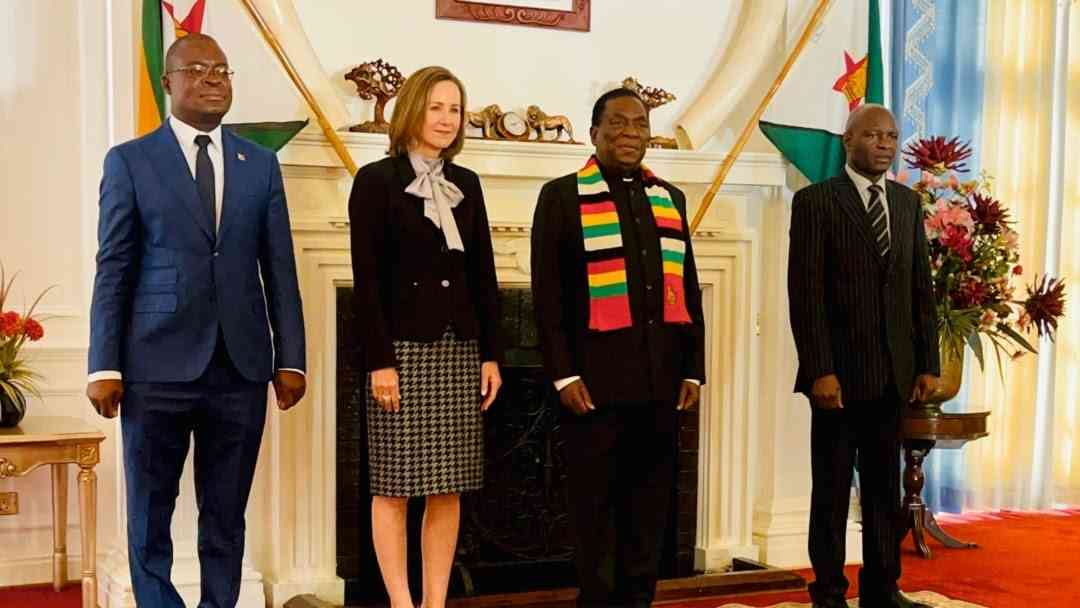
Last week, the US signalled its readiness to mend ties with Zimbabwe — after 25 years of hostility — offering an opportunity to end a conflict that has almost dragged us back to the Stone Age.
Both sides messed up. Washington misfired with “targeted sanctions” on Zimbabwe’s elites that instead crippled millions. Zimbabwe, in turn, embraced corruption, plunder, and brutal crackdowns on the opposition, civic groups, and journalists — the grim markers of a regime that refuses to reform.
Across the northern hemisphere, alarm over Zimbabwe’s implosion is growing. President Emmerson Mnangagwa must see the fault lines and act urgently before the economy collapses — again. From the way the storm clouds are gathering, we are dangerously close. Rulers living large in Harare’s plush suburbs must visit Zimbabwe’s broken townships to understand the devastation — something no amount of whiskey on a balcony can teach.
Yet there is hope.
Speaking exclusively to this newspaper at the Zimbabwe International Trade Fair last week, Pamela Tremont, the US ambassador to Zimbabwe, made it clear: Washington is ready to help a bleeding Zimbabwe rebuild through investment and trade. Her remarks offered a second chance for a country long banished to the periphery by global powers because of its leaders' greed and brutality. Importantly, mending ties with the US opens more opportunities everywhere.
This is why Tremont’s approach reflected a shifting global order. Even amid bruising trade wars, major powers are choosing cooperation over confrontation. Zimbabwe cannot afford arrogance or posturing. It must present its concerns and viewpoints to the world, listen, learn, and reform — or be left behind.
That Zimbabwe — seen abroad as a byword for autocracy and corruption — still gets a lifeline from foes is remarkable. Mnangagwa cannot afford to squander this if he truly wants to rebuild the economy.
He had global goodwill after taking power in 2017 — and blew it spectacularly. He unleashed violence against post-election protesters in 2018, ignored key recommendations from a commission of inquiry, and crushed protests over hardship in 2019 with brutal force. Investors fled. Diplomats recoiled.
- NoViolet Bulawayo’s new novel is an instant Zimbabwean classic
- Jah Prayzah, Zanu PF rekindles ‘lost love’
- Bank workers appeal to Ncube for tax relief
- Indosakusa marks 21-year anniversary milestone
Keep Reading
Now, after Tremont’s pointed remarks on democracy, corruption, and governance rot, Mnangagwa faces a stark choice: walk the talk or preside over a people in perpetual anguish.
Tremont’s message was blunt: Washington is ready to move beyond sanctions, frosty diplomacy, and humanitarian handouts. The US is pivoting towards trade, investment, and partnership. But as Tremont warned, "investors are not drawn to instability. They are drawn to certainty, transparency, and good governance".
For Mnangagwa, the choice is clear: reform, restore credibility, and unlock Zimbabwe’s potential — or continue down the road of crackdowns, corruption, and international isolation.
This moment comes as Zimbabwe’s international reputation lies in ruins. The recent arrest of journalist Blessed Mhlanga — raised last week in Britain’s House of Commons — is the latest stain. Attacks on journalists, civil society groups, and rights defenders have become routine. The controversial PVO Act was rammed into law, and Europe is now warning of disengagement from crucial debt talks.
A country cannot trade its way into prosperity with blood on its hands and thieves in the pockets.
Repression is not just a domestic issue — it carries devastating economic consequences. Investors will not touch unstable and lawless states. Every arrest, every attack, every silencing of dissent signals one thing to the world: Zimbabwe is high-risk, low-trust, and best avoided.
Mnangagwa’s defenders whimper about sovereignty and Western conspiracies. They blame sanctions for economic collapse. Although correct to some extent, the truth is uglier: Zimbabwe has been crippled by unchecked corruption, ruled by elites who flaunt stolen wealth, while state institutions are reduced to paper tigers.
Without urgent reform, Zimbabwe risks prolonging its recovery.
If Mnangagwa is serious about a reset, he must act — not just talk. Cosmetic reforms will not cut it. Investors, donors, and sympathetic nations are watching.
The current crisis, which the regime is glossing over, demands urgency. As Tapiwa Mashakada, the former Minister of Economic Development and Investment Promotion said, Zimbabwe’s economy is now over 85% informal — a clear sign of systemic collapse.
Mnangagwa must end the repression of journalists and civil society, launch a real anti-corruption drive — targeting even the untouchables inside Zanu-PF and empower institutions such as the Zimbabwe Anti-Corruption Commission to operate without political interference. He must implement credible economic reforms.
None of this will be easy. It will require courage, humility, and putting country above personal gain.
Tremont made it clear: the US wants Zimbabwe to succeed.
But if Zimbabwe won't grasp it with clean hands and a clean heart, it will be left to wither — alone.











